[Election 2017] How will presidential candidates create jobs?
By Korea HeraldPublished : April 24, 2017 - 14:57
The following is the second in a series of articles breaking down the presidential candidates’ major economic pledges in a simulated question-and-answer format by gathering their answers from their official websites, media interviews, public speeches, books and more. The second installment delves into their proposals on job creation. -- Ed.
Job creation is a top priority in presidential candidates’ campaign pledges, as the South Korean economy faces a series of problems in terms of jobs: high youth unemployment, long working hours, the wage gap between conglomerates and small firms, and discrimination against irregular workers.
Although the major candidates all emphasize the importance of creating more jobs, their pledges are widely different in terms of how jobs should be created and who should lead the efforts to do so.
Job creation is a top priority in presidential candidates’ campaign pledges, as the South Korean economy faces a series of problems in terms of jobs: high youth unemployment, long working hours, the wage gap between conglomerates and small firms, and discrimination against irregular workers.
Although the major candidates all emphasize the importance of creating more jobs, their pledges are widely different in terms of how jobs should be created and who should lead the efforts to do so.
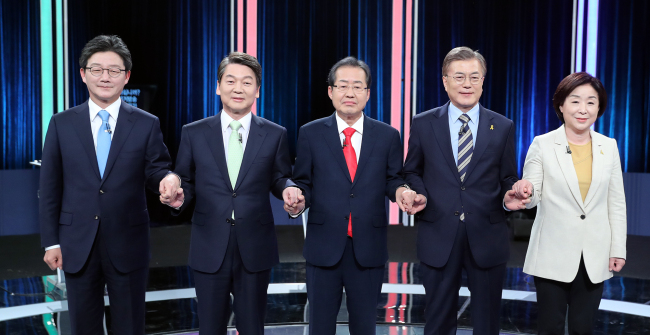
Front-runner Moon Jae-in of the main opposition Democratic Party of Korea emphasizes using fiscal spending to create jobs in the public sector, while his close rival Ahn Cheol-soo of the centrist People’s Party focuses more on the market’s role with the government’s support.
Sim Sang-jeung of the minor progressive Justice Party pledges to shorten working hours, but Yoo Seong-min of the splinter conservative Bareun Party says more jobs should come from new small businesses. Hong Joon-pyo of the conservative Liberty Korea Party focuses on reducing the power of conglomerate labor unions whose members have high salaries.
In a question-and-answer format, The Korea Herald introduces how the major candidates promise to create jobs.
Q: How do you plan to create jobs and what role should the government play?
Moon:
Sim Sang-jeung of the minor progressive Justice Party pledges to shorten working hours, but Yoo Seong-min of the splinter conservative Bareun Party says more jobs should come from new small businesses. Hong Joon-pyo of the conservative Liberty Korea Party focuses on reducing the power of conglomerate labor unions whose members have high salaries.
In a question-and-answer format, The Korea Herald introduces how the major candidates promise to create jobs.
Q: How do you plan to create jobs and what role should the government play?
Moon:
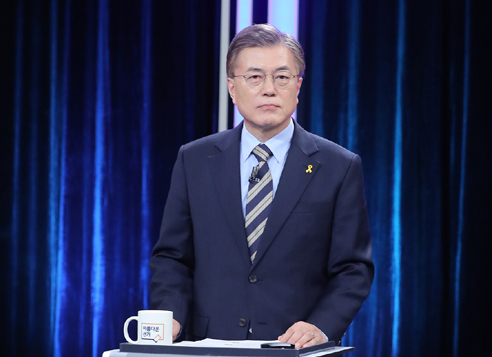
Fundamentally, it is right to say that jobs should be created by private sector companies. But, aren’t Korean companies’ job creating capacities at their limit?
(The state) has long tried to stimulate job creation by cutting corporate taxes, and investing, but that has failed. (Past policies) have failed tens of times, and that has led to a national crisis. Saying that job creation must be done by the private sector at this juncture means to continue as before.
This is irresponsible and presents no alternatives. In short, it is talking about the economy without knowing about state affairs. The private sector should create jobs, (the government) will support the Fourth Industrial Revolution, support ventures. However, it is unclear when such efforts will lead to job creation. That is why the public sector must take the lead. I want to make this clear. (In an interview with The Korea Herald on April 10)
I will basically take a two-track approach in jobs -- one for middle-aged workers and the other for youth.
If elected, I will seek legal revisions to prevent companies assignment of employees to inhumane or meaningless jobs, as many firms often do so to remove unwanted senior employees.
The system would pay workers aged over 50 who face reduced pay under new employers 30-50 percent of the difference in their salaries, if they earn less than 50 million won ($44,000).
For youths, I will expand the proportion of jobs in the public sector for the relevant age group from the current 3 percent to 5 percent by 2020. I will prepare a measure to give government subsidies to those seeking jobs and who are not covered by employment insurance. If realized, the measure will provide a monthly subsidy of 300,000 won per person for up to nine months. If a small company hires two young workers, the government will pay the wages of a third young employee. (Based on Moon’s announcement of pledges on jobs at the National Assembly on Wednesday)
I will seek to create 810,000 jobs in the public sector by spending 21 trillion won of government money over the next five years. Among them, 174,000 jobs will be as public servants, which will cost 17 trillion won, and the rest, new jobs in the public sector, which will cost 4 trillion won. (From a televised debate among presidential candidates Wednesday)
Hong:
(The state) has long tried to stimulate job creation by cutting corporate taxes, and investing, but that has failed. (Past policies) have failed tens of times, and that has led to a national crisis. Saying that job creation must be done by the private sector at this juncture means to continue as before.
This is irresponsible and presents no alternatives. In short, it is talking about the economy without knowing about state affairs. The private sector should create jobs, (the government) will support the Fourth Industrial Revolution, support ventures. However, it is unclear when such efforts will lead to job creation. That is why the public sector must take the lead. I want to make this clear. (In an interview with The Korea Herald on April 10)
I will basically take a two-track approach in jobs -- one for middle-aged workers and the other for youth.
If elected, I will seek legal revisions to prevent companies assignment of employees to inhumane or meaningless jobs, as many firms often do so to remove unwanted senior employees.
The system would pay workers aged over 50 who face reduced pay under new employers 30-50 percent of the difference in their salaries, if they earn less than 50 million won ($44,000).
For youths, I will expand the proportion of jobs in the public sector for the relevant age group from the current 3 percent to 5 percent by 2020. I will prepare a measure to give government subsidies to those seeking jobs and who are not covered by employment insurance. If realized, the measure will provide a monthly subsidy of 300,000 won per person for up to nine months. If a small company hires two young workers, the government will pay the wages of a third young employee. (Based on Moon’s announcement of pledges on jobs at the National Assembly on Wednesday)
I will seek to create 810,000 jobs in the public sector by spending 21 trillion won of government money over the next five years. Among them, 174,000 jobs will be as public servants, which will cost 17 trillion won, and the rest, new jobs in the public sector, which will cost 4 trillion won. (From a televised debate among presidential candidates Wednesday)
Hong:
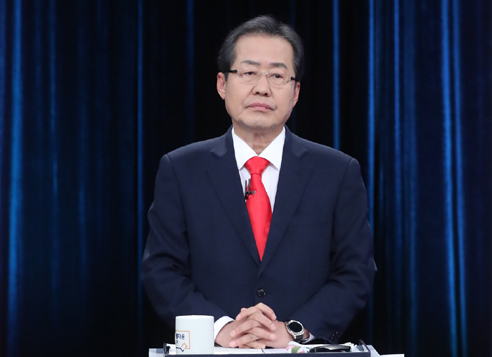
To make the job environment friendlier for youths, I will dismantle powerful labor unions that enjoy high salaries. Those powerful labor unions only represent 3 percent of all workers, but they act as if they represent 97 percent of workers. I have experience fighting against the Korea Confederation of Trade Union. I am confident about carrying out this pledge.
To create jobs for young workers, companies should be filled with high morale.
If elected, I will carry out restructuring in the public sector where there are many so-called “jobs of the gods.” (From a speech to the Korea International Trade Association in southern Seoul, Friday)
Ahn:
To create jobs for young workers, companies should be filled with high morale.
If elected, I will carry out restructuring in the public sector where there are many so-called “jobs of the gods.” (From a speech to the Korea International Trade Association in southern Seoul, Friday)
Ahn:
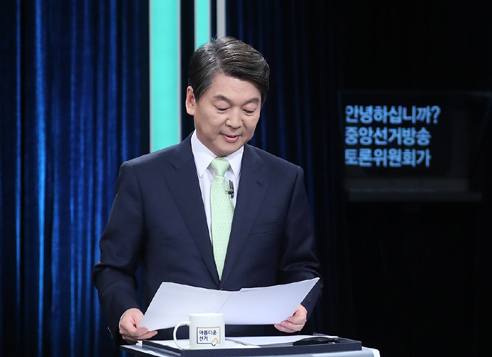
I will change the direction of job policy to focus on improving the quality of jobs and enhancing fairness in jobs, rather than simply raising the number of jobs. As a former software mogul, I will drastically reduce the number of irregular jobs and raise wages at small and medium-sized enterprises so they can become more appealing to young workers. I also promise to enhance the supervision of workplaces to make sure labor laws are properly enforced, and introduce compulsory human rights education in all schools from elementary to high schools.
I also plan to shorten working hours to 1,800 per year. South Koreans worked an average of 2,113 hours in 2015, according to the Organization for Economic Cooperation and Development. I will also raise the minimum wage from the current 6,470 won per hour to 10,000 won within five years, if elected. (Based on what he said on a visit to the Federation of Korean Trade Unions on Wednesday)
The biggest problem in the job market is that SMEs have difficulty hiring young workers. Through government support, I will temporarily raise the average salary of workers at SMEs to 80 percent of those at conglomerates. For this measure, I am thinking about providing a monthly subsidy of 500,000 won per young worker at SMEs for two years. About 100,000 young workers will be subject to this measure and the government will need about 5.2 trillion won from the annual budget. I can make this happen because budget can be reallocated from the 2.3 trillion won budget for unemployed youth and 17 trillion won budget for jobs. (From a speech to the Council of Small and Medium-sized Enterprises in Yeouido, Seoul, on April 11)
Yoo:
I also plan to shorten working hours to 1,800 per year. South Koreans worked an average of 2,113 hours in 2015, according to the Organization for Economic Cooperation and Development. I will also raise the minimum wage from the current 6,470 won per hour to 10,000 won within five years, if elected. (Based on what he said on a visit to the Federation of Korean Trade Unions on Wednesday)
The biggest problem in the job market is that SMEs have difficulty hiring young workers. Through government support, I will temporarily raise the average salary of workers at SMEs to 80 percent of those at conglomerates. For this measure, I am thinking about providing a monthly subsidy of 500,000 won per young worker at SMEs for two years. About 100,000 young workers will be subject to this measure and the government will need about 5.2 trillion won from the annual budget. I can make this happen because budget can be reallocated from the 2.3 trillion won budget for unemployed youth and 17 trillion won budget for jobs. (From a speech to the Council of Small and Medium-sized Enterprises in Yeouido, Seoul, on April 11)
Yoo:
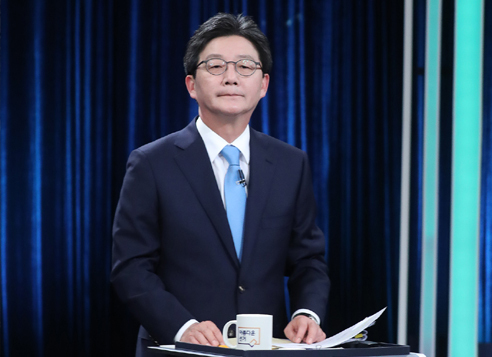
I believe jobs should be created by SMEs and the current government’s conglomerate-focused economic policies cannot support SMEs. If elected as president, I will raise the status of the Small and Medium Business Administration to become the “Venture Small and Medium Ministry” to meet executives of SMEs as often as possible, as opposed to the former president who usually met heads of conglomerates.
I will also create a “Maker’s Lab,” an incubator to support the costs faced by SMEs when they develop new ideas, new products and technologies. (From a speech to the Council of Small and Medium-sized Enterprises in Yeouido, Seoul, on April 14)
I will also ban conglomerates, state-run firms and financial institutions from intentionally hiring irregular workers, as they often do to reduce wage costs. (Based on Yoo’s announcement of pledges on jobs on Feb. 23)
Sim:
I will also create a “Maker’s Lab,” an incubator to support the costs faced by SMEs when they develop new ideas, new products and technologies. (From a speech to the Council of Small and Medium-sized Enterprises in Yeouido, Seoul, on April 14)
I will also ban conglomerates, state-run firms and financial institutions from intentionally hiring irregular workers, as they often do to reduce wage costs. (Based on Yoo’s announcement of pledges on jobs on Feb. 23)
Sim:
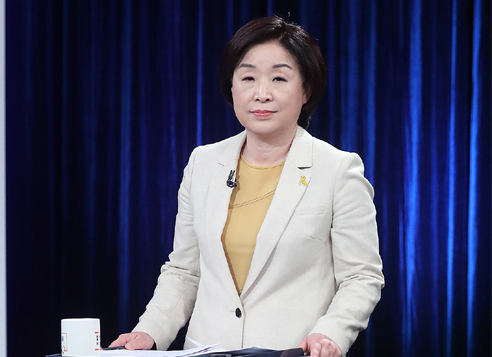
I believe that our country needs to remove irregular jobs, raise minimum wages and pay an amount of money equal to the amount of work. My jobs policy will focus on reducing work hours to make it possible to leave work at 5 p.m. from 2022. Then we will be able begin a new era of a 35-hour work week in 2025. As a first step, I will pursue labor law revisions to make companies abide by the 40-hour work week rule through the banning of overtime that extends working hours to more than 12 hours a day. Taking several steps, I will root out such extra work by 2021.
For youths, I will make it compulsory in companies with more than 300 employees to allocate more than 5 percent of jobs to young workers. Among the jobless aged between 15 and 35, those who are not covered by employment insurance will be able to get half of the minimum wage through subsidies. (From a press conference at the National Assembly on Tuesday)
By Kim Yoon-mi (yoonmi@heraldcorp.com)
For youths, I will make it compulsory in companies with more than 300 employees to allocate more than 5 percent of jobs to young workers. Among the jobless aged between 15 and 35, those who are not covered by employment insurance will be able to get half of the minimum wage through subsidies. (From a press conference at the National Assembly on Tuesday)
By Kim Yoon-mi (yoonmi@heraldcorp.com)
-
Articles by Korea Herald



![[Exclusive] Korean military set to ban iPhones over 'security' concerns](http://res.heraldm.com/phpwas/restmb_idxmake.php?idx=644&simg=/content/image/2024/04/23/20240423050599_0.jpg&u=20240423183955)




![[Pressure points] Leggings in public: Fashion statement or social faux pas?](http://res.heraldm.com/phpwas/restmb_idxmake.php?idx=644&simg=/content/image/2024/04/23/20240423050669_0.jpg&u=)











